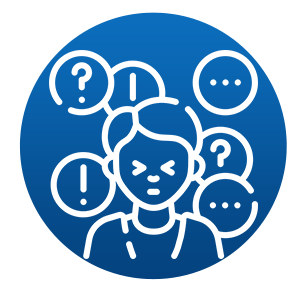ADHD Treatment Near Cincinnati, Dayton, and Columbus, OH
Helping You Stay Focused on the Things in Life that Matter — Book A Private Phone Consult to Learn More Today!

ADHD DOCTORS IN OHIO
KAV Mental Health & Psychiatry is a mental health service provider based in Southwestern and Central Ohio, where we treat patients from Cincinnati, Columbus, Dayton, and beyond. Through our comprehensive range of counseling services and prescription medications, we diagnose and manage our patients’ mental health disorders, empowering them to live happier, healthier lives.
Among the mental health disorders we treat is attention deficit hyperactivity disorder, often shortened to ADHD. Patients come to us with different types and severities of ADHD, and we equip them with tools to help them control their focus and thrive in their daily lives. Read on to learn more about ADHD, what it’s like for those who have it, and how our ADHD doctors help patients effectively address this common mental health disorder.
What Is ADHD?
ADHD is short for attention deficit hyperactivity disorder, a term which broadly describes someone with the inability to regulate their focus, energy levels, or impulsivity. This can prevent them from staying engaged with any one thing for very long, and often leads to bouts of intense hyperfixation.
You may have heard the term ADD (attention deficit disorder) in the past. However, this is considered dated terminology: there are now subtypes of ADHD that account for less hyperactivity.
Modern society is filled with activities that require a significant degree of concentration or focus, starting when we’re very young. A child with ADHD may have trouble focusing on school, and as they get older, the stakes go up: responsibilities such as driving, employment, and even maintaining relationships can all be impacted by a lack of focus, or focusing on the wrong things.
Types of ADHD
There are a few types of ADHD, each with unique characteristics:
Inattentive
Their focus shifts frequently and prevents them from completing tasks. They might appear to be highly disorganized as they hyperfixate on one thing after another.
Hyperactive / Impulsive
They are unable to stay still for long. They’ll constantly be on the move or looking for something new to hold their attention and use their high energy.
Blended
They exhibit some combination of inconsistent focus, hyperactivity, and impulsive behaviors. These traits feed into each other and create a cycle that can be difficult to break.
Regardless of what someone’s ADHD looks like, it can take away from their ability to live their life to the fullest by making it hard to complete tasks, interrupting their relationships, and lowering their self-esteem.

Signs & Symptoms of ADHD
Some hyperactivity, inattention, and impulsivity is normal, particularly in children, but with ADHD, these traits become more extreme and actively interfere with people’s lives. The signs and symptoms of ADHD can vary, but generally fall into three main categories:
- Hyperactivity
- Constant fidgeting
- Nonstop talking or discomfort with silence
- Inattention
- Short attention spans or lack of concentration, especially in longer tasks
- Repeatedly making careless mistakes
- Forgetfulness
- Lack of organization
- Impulsivity
- An inability to wait one’s turn, or other signs of impatience
- Acting without regard for safety
These may seem fairly harmless in children: forgetting homework and being a little recklessness on the playground aren’t exactly major issues. But if symptoms are left untreated, they can become more intense and make it difficult for someone with ADHD to act in their own self-interest.
Causes & Risk Factors of ADHD
With ADHD, there’s no one particular cause. However, some factors have been identified to increase the likelihood of ADHD developing:
- Genetics: ADHD tends to run in families
- Gender: Boys are more likely to develop ADHD than girls
- Pregnancy Issues: Infants born prematurely, or from a mother who used drugs while pregnant
- Environmental Factors: Early exposure to toxins like lead in paint or pipes
It’s also worth noting that ADHD is heavily correlated with other mental health disorders. There’s no way to say if ADHD leads to other mental illnesses, vice versa, or they develop simultaneously.
- Children with ADHD can be more likely to have anxiety, depression, Tourette’s syndrome, or be on the Autism spectrum
- Adults with ADHD can be more likely to have bipolar disorder, a personality disorder, obsessive-compulsive disorder, or a substance use disorder (SUD)


Causes & Risk Factors of ADHD
With ADHD, there’s no one particular cause. However, some factors have been identified to increase the likelihood of ADHD developing:
- Genetics: ADHD tends to run in families
- Gender: Boys are more likely to develop ADHD than girls
- Pregnancy Issues: Infants born prematurely, or from a mother who used drugs while pregnant
- Environmental Factors: Early exposure to toxins like lead in paint or pipes
It’s also worth noting that ADHD is heavily correlated with other mental health disorders. There’s no way to say if ADHD leads to other mental illnesses, vice versa, or they develop simultaneously.
- Children with ADHD can be more likely to have anxiety, depression, Tourette’s syndrome, or be on the Autism spectrum
- Adults with ADHD can be more likely to have bipolar disorder, a personality disorder, obsessive-compulsive disorder, or a substance use disorder (SUD)
Long-Term Effects of ADHD
Symptoms often start appearing when a child is very young and still undergoing a lot of change in their lives, meaning it impacts their development from early on. They might not retain information as well as others, or be able to engage with others socially. The ensuing isolation — and boredom — can lead to destructive cycles of behavior.
If symptoms are allowed to compound, an adult with ADHD will experience difficulty forming and maintaining stable situations. This can be evident with friendships, romantic relationships, employment, and beyond. When someone is struggling to move forward in their lives, it can cause low self-esteem and further hinder their ability to accomplish goals and lead a fulfilling life.

ADHD Treatment & Counseling with KAV Mental Health & Psychiatry
At KAV Mental Health & Psychiatry, our expert, compassionate doctors treat people with ADHD as individuals who deserve tailored care, using a case-by-case combination of medication and counseling.
Prescription medication for ADHD can help increase focus and self-control, and generally slow things down for people. Individual counseling, meanwhile, is an opportunity to work with a professional on developing tools and techniques to better focus and practice self-control. We also offer group therapy where people facing similar issues can build on each other’s experiences and find support they might not otherwise have had.
Our mental health professionals conduct online appointments through a secure and HIPAA-compliant video platform, with same-day scheduling available six days a week so that help is accessible when you need it most. Telehealth provides a convenient way to get the one-on-one attention you need and ensure that you’re on track with your mental health.



